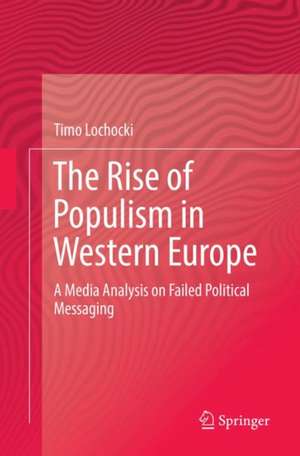The Rise of Populism in Western Europe: A Media Analysis on Failed Political Messaging
Autor Timo Lochockien Limba Engleză Paperback – 11 aug 2018
This book explores the question of why and under which conditions right-wing populist parties receive electoral support. The author argues that neither economic variables, nor national culture or history are what account for their successes. Instead, he illustrates that the electoral success of populist parties in Western Europe, such as the French Front National or the Alternative for Germany, is best understood as the unintended consequence of misleading political messaging on the part of established political actors.
A two-level theory explains why moderate politicians have changed their approaches to political messaging, potentially benefiting the nationalist, anti-elitist and anti-immigration rhetoric of their populist contenders. Lastly, the book’s theoretical assumptions are empirically validated by case studies on the immigration societies of Germany, the Netherlands and Sweden.
| Toate formatele și edițiile | Preț | Express |
|---|---|---|
| Paperback (1) | 443.42 lei 38-44 zile | |
| Springer International Publishing – 11 aug 2018 | 443.42 lei 38-44 zile | |
| Hardback (1) | 697.32 lei 43-57 zile | |
| Springer International Publishing – 6 sep 2017 | 697.32 lei 43-57 zile |
Preț: 443.42 lei
Preț vechi: 554.26 lei
-20% Nou
Puncte Express: 665
Preț estimativ în valută:
84.85€ • 88.83$ • 70.21£
84.85€ • 88.83$ • 70.21£
Carte tipărită la comandă
Livrare economică 02-08 aprilie
Preluare comenzi: 021 569.72.76
Specificații
ISBN-13: 9783319874128
ISBN-10: 3319874128
Pagini: 162
Ilustrații: XVIII, 162 p. 42 illus.
Dimensiuni: 155 x 235 mm
Ediția:Softcover reprint of the original 1st ed. 2018
Editura: Springer International Publishing
Colecția Springer
Locul publicării:Cham, Switzerland
ISBN-10: 3319874128
Pagini: 162
Ilustrații: XVIII, 162 p. 42 illus.
Dimensiuni: 155 x 235 mm
Ediția:Softcover reprint of the original 1st ed. 2018
Editura: Springer International Publishing
Colecția Springer
Locul publicării:Cham, Switzerland
Cuprins
Foreword.- Preface.- 1.Introduction: How the failed political messaging of moderate political actors strengthens populist radical right parties.- 2.The Riddle: Why are some populist radical right parties more successful than others?.- 3.State of Research: Linking social theory with comparative politics.- 4.Research Design: Ensuring high validity and high reliability under the auspices of comparative case studies.- 5.Empirical Results: Why populistis win or lose - a two-level theory.- 6.The Netherlands: The PvdA's pyrrhic victories, or Waiting for Pim Fortuyn.- 7.Sweden: How the Liberals (FP) gave birth to the Swedish Democrats (SD).- 8.Germany: How a conservative compromise between the CDU/CSU and SPD blocked the populist radical right parties REP and Schill.- 9.Generalizing the Findings: Explaining the rise of the AfD and UKIP.- 10.Conclusioni: It's political messaging, stupid!.
Notă biografică
Dr. Timo Lochocki is a transatlantic fellow with the Europe program where he directs GMF’s research activities on European diversity and party politics. He studied social psychology and international politics in Germany, Norway, and the United States and holds a Ph.D. in comparative politics from the Humboldt University Berlin, where he is a lecturer for European Politics. His award-winning research focuses on the intersection between international policy challenges (migration and matters of European Integration, in particular) and European party politics. Explaining the varying electoral advances of right-wing populist parties in Europe over the last 30 years, his doctoral thesis was graded as summa cum laude. His GMF Europe policy paper "The Unstoppable Far Right? How established parties’ communication strategies and media reporting of European affairs affect the advances of right-wing populist parties" won the award for the best paper at the European Communication Research and Education Association (ECREA) Conference 2015. He regularly comments European and German party politics for national and international news outlets as Der Tagesspiegel, The Economist, Politico Europe or The London Times.
Textul de pe ultima copertă
This book explores the question of why and under which conditions right-wing populist parties receive electoral support. The author argues that neither economic variables, nor national culture or history are what account for their successes. Instead, he illustrates that the electoral success of populist parties in Western Europe, such as the French Front National or the Alternative for Germany, is best understood as the unintended consequence of misleading political messaging on the part of established political actors.
A two-level theory explains why moderate politicians have changed their approaches to political messaging, potentially benefiting the nationalist, anti-elitist and anti-immigration rhetoric of their populist contenders. Lastly, the book’s theoretical assumptions are empirically validated by case studies on the immigration societies of Germany, the Netherlands and Sweden.
"Timo Lochocki’s fascinating book systematically shows that the fortunes ofnationalist parties depend, at least in part, on the positions adopted by their more mainstream competitors."
Tim Bale, Queen Mary University of London, UKA two-level theory explains why moderate politicians have changed their approaches to political messaging, potentially benefiting the nationalist, anti-elitist and anti-immigration rhetoric of their populist contenders. Lastly, the book’s theoretical assumptions are empirically validated by case studies on the immigration societies of Germany, the Netherlands and Sweden.
"Timo Lochocki’s fascinating book systematically shows that the fortunes ofnationalist parties depend, at least in part, on the positions adopted by their more mainstream competitors."
"This book provides valuable insights into populist radical-right politics in Western Europe. Timo Lochocki argues that a “crisis of conservatism” created the perfect context for the rise of nationalist parties."
Cas Mudde, University of Georgia, GA, USA
"Timo Lochocki’s book uses high-quality comparative research to tackle numerous misperceptions and mistaken assumptions about the rise and persistence of nationalist parties across Europe. It is a must-read for anybody following the debate on where Europe is today and where it might be tomorrow."
Matthew Goodwin, University of Kent, UK
Caracteristici
Offers a generalizable and empirically backed theory for the rise and fall of right-wing populist parties Shows why political messaging is the key factor in today’s politics Presents case studies on the success of populist right-wing parties in Germany, the Netherlands and Sweden
